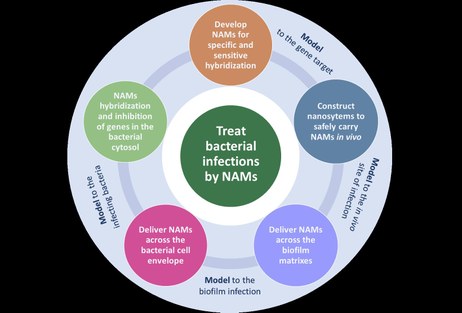WIDESPREAD - DelNAM
Cross-cutting issues - WIDESPREAD - DelNAM
Strengthening the Research Area of Delivery of Nucleic Acid mimicks (NAMs) into bacteria to fight the antibiotic crisis.
DelNAM
H2020-WIDESPREAD-05-2017
Bacterial resistance to antibiotics is a major threat to the global public health. Antimicrobial resistance is already responsible for more than 700 000 annual deaths in the world and this is predicted to rise to 10 million deaths in 20503. Therefore, novel therapeutic solutions against bacterial infections are urgently needed. DelNAM aims at Strengthening the Research Area of Delivery of Nucleic Acid Mimics (NAMS) into bacteria to fight the antibiotic crisis. The project will allow the development of a consolidated strategic research approach and a set of guidelines for exploitation and commercialization of the results that will have a strong regional, national and European impact. The proposal integrates synergies in complementary fields of research that include nanotechnology, synthetic chemistry, microbiology and bioprocess modelling, aiming to obtain scientific breakthroughs that can improve the global health and economy.
Research objectives
Antisense oligonucleotides designed to inhibit the expression of specific bacterial genes have the potential to become an alternative solution to combat microbial resistance. The oligonucleotides can serve as antibacterial drugs to replace antibiotics, if they target genes essential for bacterial growth. Alternatively, oligonucleotides that target genes of resistance to antibiotics can restore bacterial susceptibility to antibiotics, thus serving as adjuvants drugs of antibiotics. In this proposal, we will develop suitable carriers for the safe delivery of NAMs across biofilm matrixes and intracellularly into bacterial cells as a novel treatment of bacterial infections. In particular, we aim to study and model the delivery efficacy of NAMs in biofilms and into bacterial cells, according to the type of NAM, carrier, bacteria and site of infection. This work will set the rules that govern the delivery of NAMs by nanocarriers into different planktonic bacteria and biofilms infecting the human body. Such knowledge will tremendously impact the use of NAMs to solve antibiotic crisis.
Role of Ghent University within the research Consortium
The role of Ghent University is to develop nanocarriers able to incorporate the NAMs and safely transport them across the biological media of the in vivo site of infection. These nanocarriers should be optimized in order to be able to cross the biofilm matrixes and intracellularly deliver the NAMs across the bacterial envelope of different gram-positive and -negative bacterial pathogens.
Contact
Prof. dr Stefaan De Smedt
Ghent Research Group on Nanomedicines
Department of Pharmaceutics
Phone number: + 32 9 264 80 76
E-mail: Stefaan.desmedt@Ugent.be
